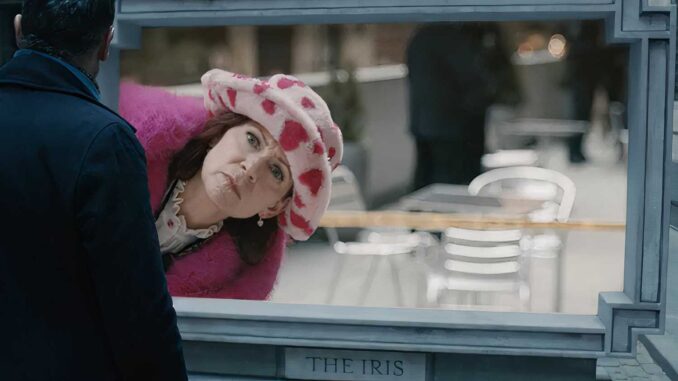
I Hope It's Not Closed: The Delicate Dance of "Closed for Business" and "Opening the Door" in the Elsbeth & Angus Dynamic
The flashing neon sign sputtered above the dusty window: "Closed for Business." It's a universal symbol of unavailability, of a door firmly shut. Yet, as anyone who's ever peered into a darkened shop after hours knows, there's always a flicker of hope, a lingering possibility that maybe, just maybe, the lock is loose, the owner nearby, and the door might swing open. This sense of both closedness and latent potential perfectly encapsulates the burgeoning dynamic between Elsbeth Tascioni and Angus Windham, as hinted at by the showrunner of CBS's delightfully quirky crime procedural, Elsbeth. The potential for a romantic future between them, as the showrunner alluded to, hangs in the air like that sputtering neon sign, leaving viewers wondering: is this relationship closed for business, or is there a chance it might, one day, open the door?
Elsbeth, with her kaleidoscope mind and uncanny ability to decipher the human puzzle, presents a formidable challenge to any romantic prospect. She's a force of nature, her brilliance often manifesting as charming eccentricities. Her mind races along tangents, connecting disparate threads into a coherent, crime-solving tapestry. This singularity, while captivating, also creates a sense of inaccessibility. She's so deeply entrenched in her own unique process that penetrating her inner world feels like trying to decipher a complex code. The "Closed for Business" sign hangs over her, a testament to her intellectual intensity and her deep commitment to justice.
Angus, on the other hand, provides the grounded counterpoint to Elsbeth's whirlwind. He's meticulous, organized, and possesses a quiet, understated charm. He navigates the bureaucratic labyrinth of the NYPD with ease, often smoothing the path for Elsbeth's unconventional methods. He admires her brilliance, but he also witnesses firsthand the chaos it sometimes creates. He sees the "Closed for Business" sign, but instead of turning away, he seems intrigued, drawn to the mystery behind the locked door. He patiently observes, offering support without intrusion, a gentle nudge instead of a forceful push.
The tension, the potential for something more, arises from this very dynamic. Angus understands that Elsbeth isn't simply closed off. She's operating on a different frequency, and he's willing to learn her language. He anticipates her needs, he deciphers her cryptic clues, and he champions her unconventional approach, even when it clashes with protocol. This unspoken connection, this shared understanding, is the chink in the armor, the glimmer of light seeping through the cracks of the "Closed for Business" facade.
The key to unlocking the potential for a romantic future lies in gradual trust and mutual respect. Elsbeth, for all her brilliance, is also vulnerable. She relies on her intuition, but she needs anchors, individuals she can trust implicitly. Angus, with his unwavering loyalty and his genuine appreciation for her unique perspective, is steadily building that trust. He's proving that he can navigate her world, understand her eccentricities, and appreciate her for who she is, flaws and all.
Furthermore, the show's episodic nature, focusing on solving intricate crimes, allows for the gradual unveiling of their personalities. Each case provides opportunities for them to collaborate, to challenge each other, and to witness the other's strengths. These shared experiences forge a bond that transcends professional respect. We see glimpses of genuine affection, of shared laughter, and of quiet understanding passing between them. These moments, though subtle, are significant, like the soft glow of a lamp inside the darkened shop, hinting at the life and activity within.
However, the beauty of Elsbeth lies in its restraint. It doesn't force the issue. The romantic potential remains a simmering undercurrent, a tantalizing possibility rather than a foregone conclusion. This allows the audience to participate in the speculation, to root for the connection to deepen while appreciating the complexities of their individual characters. It’s a delicate dance, a careful exploration of compatibility and connection, where the "Closed for Business" sign could, at any moment, flicker and fade, replaced by the welcoming glow of an open door.
In conclusion, the question of a romantic future for Elsbeth and Angus is not about simply tearing down the "Closed for Business" sign. It's about carefully considering whether both parties are ready and willing to open the door. It's about understanding the challenges and appreciating the rewards of navigating a relationship built on mutual respect, intellectual curiosity, and genuine affection. The showrunner's hint has sparked the imagination, leaving viewers with a sense of hopeful anticipation, eager to see if this unconventional duo will ultimately decide to open the door to a future that is both professionally fulfilling and potentially, romantically rewarding. And as we watch them navigate the intricate puzzles of New York's criminal underbelly, we, too, hope that the door might eventually swing open, revealing a love story as unique and captivating as Elsbeth herself.
